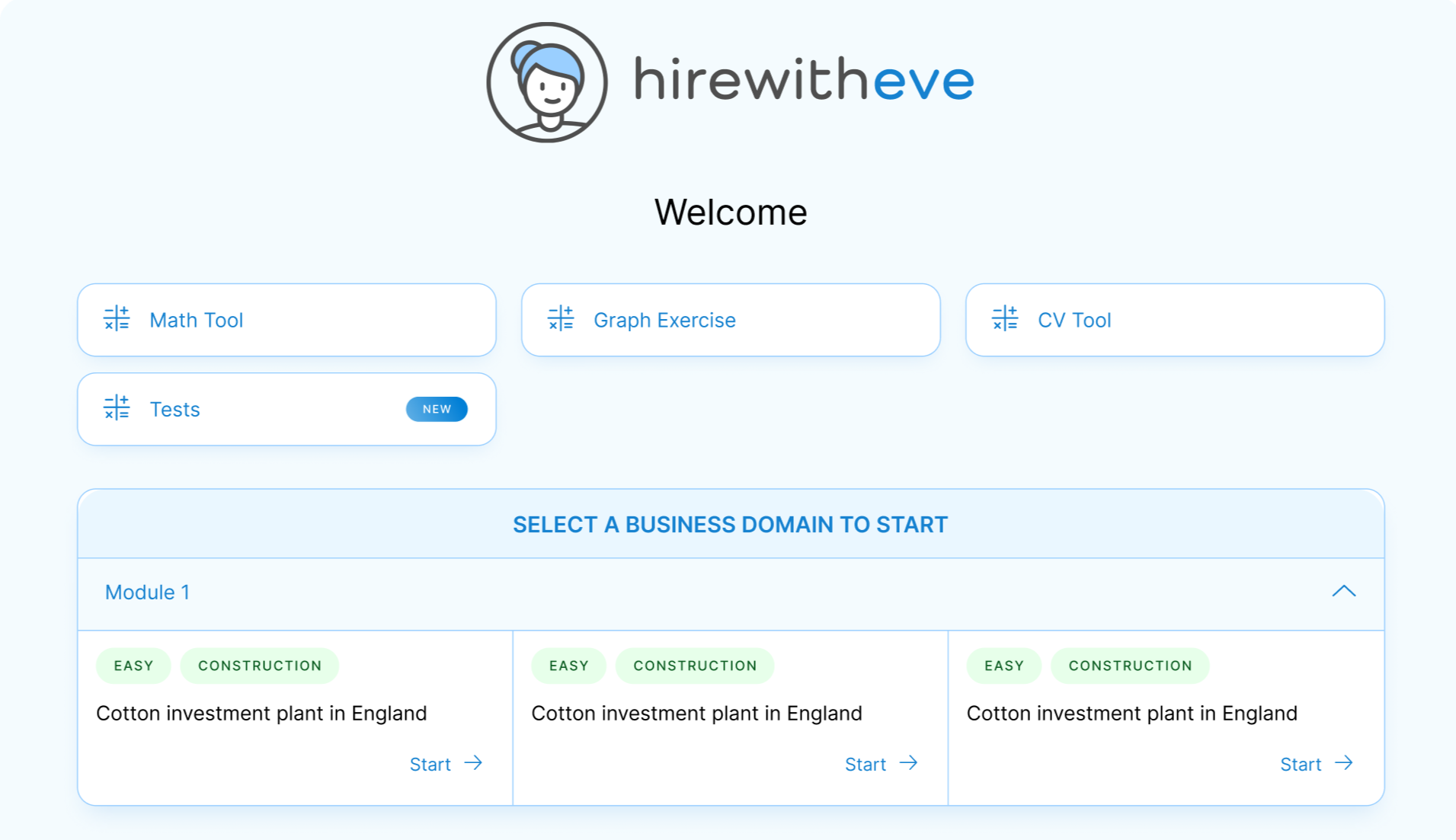Comprehensive Guide to Employee Selection Methods

The strength of your team is a critical factor that can determine your company's success or failure. The right team can drive innovation, efficiency, and growth, while a poor hiring decision can lead to missed opportunities, decreased productivity, and increased costs. Therefore, finding the right talent is not just important, it's essential.
This blog delves into the intricacies of employee selection, offering insights into various methods and highlighting the importance of using the right tools, such as HirewithEve, to ensure your hiring process is precise and efficient.
Table of contents
What is Employee Selection?
Why Choosing the Right Candidates is Pivotal for Organizational Success
Types of Employee Selection Methods
Top 20 Employee Selection Methods
How HirewithEve Supports Optimized Employee Selection
Conclusion
What is Employee Selection?
Employee selection is evaluating and choosing the most suitable candidates from a pool of applicants for a specific job role. This process involves a series of steps designed to assess the qualifications, skills, experience, and overall fit of candidates against the position's requirements and the organization's culture. Effective employee selection is critical for organizational success as it ensures that the right individuals are brought into the company, contributing to its long-term goals and objectives.
Why Choosing the Right Candidates is Pivotal for Organizational Success
Choosing the right candidates is pivotal for the success of any organization because they bring the necessary skills, values, and drive that align with the company's goals. The right hires enhance productivity and innovation while fostering a positive work culture that propels the organization forward.
Key Points:
Skills Alignment: Ensures that candidates can perform the job effectively from the start.
Cultural Fit: Candidates who align with company culture integrate better, leading to a cohesive work environment.
Growth Potential: Identifying candidates who have the potential to grow and contribute to long-term goals.
Competitive Advantage: Companies that excel in selecting top talent outperform their competitors.
Types of Employee Selection Methods
Traditional Methods
Resume Screening
A foundational step where employers evaluate resumes to assess qualifications, skills, and experiences relevant to the job.
Interviews
Direct interaction between candidate and employer, providing deeper insights into the candidate's suitability.
Modern Methods
Skills Assessments
Evaluating candidate's technical skills and abilities related to the job role through tests or challenges.
Automated Screening Tools
Streamlining the initial screening process using AI to identify promising candidates quickly.
Top 20 Employee Selection Methods
Skills Assessments
Skills assessments are designed to evaluate a candidate's technical abilities or job-related skills. These can include tasks such as coding challenges for developers, writing tests for content creators, or situational problem-solving exercises for managers. By focusing on practical skills, these assessments provide a clear indication of a candidate's ability to perform the job effectively from day one.
Video Interviews
Video interviews have become increasingly popular, especially in the context of remote work. These interviews can be conducted live or recorded, allowing candidates to answer questions at their convenience. Video interviews offer the flexibility to reach a broader pool of candidates and can be used as a preliminary screening tool before in-person interviews.
Work Samples and Simulations
Work samples involve giving candidates tasks or projects that are similar to the work they would be doing if hired. Simulations, on the other hand, recreate specific job scenarios to observe how candidates handle them. Both methods provide insight into a candidate's practical skills and how they might perform in real job situations.
Automated Screening Tools
Automated screening tools leverage AI and machine learning to analyze resumes and applications, filtering out candidates who don't meet the basic criteria. These tools can quickly identify top candidates, saving time and resources during the early stages of the hiring process.
Assessment Centers
Assessment centers are comprehensive evaluation processes where candidates participate in multiple exercises, such as group discussions, role-playing, and case studies. These centers provide a thorough assessment of a candidate’s capabilities, including leadership, teamwork, and communication skills.
Situational Judgement Tests (SJTs)
Situational Judgement Tests present candidates with hypothetical job-related scenarios and ask them to choose the most appropriate response. These tests assess how candidates would handle specific challenges and situations they might encounter in the role.
Cognitive Ability Tests
Cognitive ability tests measure a candidate's mental capacities, such as reasoning, memory, problem-solving, and comprehension skills. These tests are strong predictors of job performance, particularly in roles that require critical thinking and learning new information.
Psychometric Tests
Psychometric tests assess a candidate's mental capabilities, personality traits, and behavioral styles. These tests can include measurements of intelligence, aptitudes, and personality dimensions, helping employers understand how a candidate thinks and behaves.
Personality Tests
Personality tests evaluate traits like extroversion, agreeableness, and conscientiousness to predict how well a candidate might fit within the company culture and team dynamics. Common tests include the Myers-Briggs Type Indicator (MBTI) and the Big Five personality traits.
Job Trials
Job trials involve giving candidates a short-term assignment or probationary period where they can work in the actual role. This method allows both the candidate and the employer to assess suitability for the job before making a permanent commitment.
Background Checks
Background checks verify a candidate's employment history, education, criminal record, and other relevant information. These checks ensure that candidates meet the company’s standards and that there are no discrepancies in their application.
Reference Checks
Reference checks involve contacting a candidate’s previous employers, colleagues, or other references to gather information about their work performance, behavior, and reliability. This step helps verify the candidate’s claims and provides additional insights into their suitability for the role.
Social Media Screening
Social media screening involves reviewing a candidate's social media profiles to gain insights into their personality, professionalism, and cultural fit. While not always conclusive, social media profiles can offer a glimpse into how candidates present themselves publicly.
Behavioral Interviews
Behavioral interviews focus on asking candidates about their past experiences and behaviors in specific situations. This method is based on the premise that past behavior is the best predictor of future performance.
Panel Interviews
Panel interviews involve multiple interviewers who ask questions and evaluate candidates together. This method provides a more balanced and comprehensive assessment, as different perspectives can be considered.
Group Interviews
Group interviews involve assessing multiple candidates simultaneously, often by having them participate in group tasks or discussions. This method is particularly useful for roles that require strong teamwork and communication skills.
Gamified Assessments
Gamified assessments use game-like elements to evaluate candidates’ skills, problem-solving abilities, and personality traits. These assessments are engaging and can provide a fun yet insightful way to gauge a candidate's fit for the role.
Job Auditions
Job auditions are short-term assignments or projects that candidates complete as part of the selection process. These auditions provide a clear indication of how candidates perform on actual tasks related to the job.
Integrity Tests
Integrity tests measure a candidate’s honesty, ethics, and reliability. These tests are often used to screen for potential issues related to theft, fraud, or other unethical behaviors.
Competency-Based Interviews
Competency-based interviews focus on assessing specific skills and competencies required for the job. Candidates are asked to provide examples of how they have demonstrated these competencies in past roles.
How HirewithEve Supports Optimized Employee Selection
HirewithEve is designed to enhance the employee selection process by offering tools and features that align perfectly with modern hiring needs. Here’s how HirewithEve can support your hiring process:
Skills-Based Assessments: HirewithEve offers customizable assessments that allow recruiters to evaluate candidates' technical skills and job readiness effectively. This feature ensures that only the most qualified candidates proceed to the next stage of the hiring process.
Comprehensive Analytics: HirewithEve provides robust analytics that offers insights into candidate performance, hiring trends, and process efficiency. These insights help HR managers and talent acquisition specialists make data-driven decisions, improving the overall quality of hires.
Cultural Fit Assessments: Understanding how well a candidate will integrate into your company culture is crucial. HirewithEve includes features that help assess cultural fit, ensuring that new hires align with your organizational values and work environment.
Enhanced Candidate Experience: HirewithEve focuses on creating a positive candidate experience, which is essential for attracting top talent. The platform’s user-friendly interface and streamlined processes ensure that candidates have a smooth and engaging experience throughout the hiring process.
Conclusion
The employee selection process is a critical aspect of building a successful and innovative team. By adopting a strategic approach to hiring, companies can ensure that they bring in individuals who not only have the necessary skills but also fit well within the company culture. Leveraging modern tools like HirewithEve can significantly enhance the efficiency and effectiveness of your hiring process, leading to better outcomes and a stronger, more cohesive team.
Target Your Talent
Unlock tailored solutions for your recruitment and hiring needs with Eve Platform's extensive case study library.
Subscribe now to enhance your HR expertise and excel in your role.
Free Resources

Transforming Hiring: 7 Key Recruiting Metrics
Enhancing recruitment processes with data-driven insights for better hiring outcomes.

Reducing Hiring Bias with Hirewitheve.
Utilizing Hirewitheve to combat bias and streamline recruitment processes effectively.

Hiring Detail-Oriented Candidates
HirewithEve enhances hiring by accurately assessing candidate's attention to detail-oriented.








